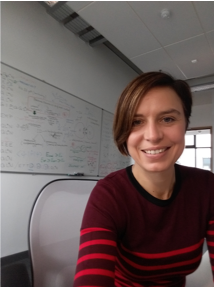Elisa Fadda, ICHEC Users Council Chair
 Elisa Fadda is the lecturer and principal investigator (PI) in Computational Chemistry and Biophysics in the Department of Chemistry and in the Hamilton Institute at Maynooth University.
Elisa Fadda is the lecturer and principal investigator (PI) in Computational Chemistry and Biophysics in the Department of Chemistry and in the Hamilton Institute at Maynooth University.
In her lab they use high performance computing (HPC)-based simulations to understand how interactions that involve highly dynamic biomolecules, such as complex carbohydrates (glycans) and structureless (disordered) proteins, are regulated in health and disease. These systems are ubiquitous and fundamental, while difficult to study experimentally because they move too fast to be caught ‘on camera’. Elisa explains "this is a research field where computing can hugely contribute to scientific knowledge, making sense of sparse and underdetermined experimental data, while independently producing workable hypotheses for the development of new therapeutic and diagnostic strategies."
Research in Elisa’s lab is currently entirely based on HPC. Possibly to the surprise of some, the computational resources requirements are pretty hefty and sometimes in the order of millions of core hours dedicated to each project. "Indeed, the biomolecular processes we study are very complex to reproduce reliably. They take place at timescales that are many orders of magnitude larger relative to the computational time step, which is in the order of femto (10-15) seconds, and they may involve energetic transitions, or the combinations of rare events, that are difficult (or impossible) to observe in relatively short simulations. Accelerated simulation schemes and replication of long computational experiments are essential to guarantee the validity of the results. This all takes a very large amount of HPC resources."
According to Elisa's words, in her career, ICHEC has been instrumental in getting her career as a PI up and running and it is the main HPC infrastructure that they currently rely on in the lab. She states "The resources that ICHEC provides to the Irish scientific community are state-of-the-art".
"In addition to that," she continues " ICHEC offers a very highly skilled user support system, both in terms of software development, optimization and troubleshooting and of hardware installation and administration. With the wide range of scientific backgrounds, the ICHEC team has direct experience in makes the communication with the different users really easy. We are extremely appreciative of the work that everyone at ICHEC does and for the funding that supports this invaluable service to the Irish research community".
In the recent years the world of computing has been going through a massive revolution with the advent of what is broadly known as ‘artificial intelligence’ (AI). The use of highly trained neural networks in drug discovery and in the design of synthetic proteins and new (bio)materials is showing incredible potentials. She believes that AI is what the exciting future of HPC holds, a great technological advancement that we all will be going to be involved in and benefit from some way or another.
Elisa Fadda is a very active user of ICHEC resources and currently the ICHEC Users Council Chairwoman.




